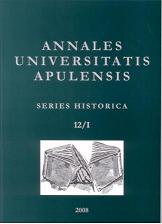Între pîşkeş (dar) şi rüşvet (mită). Relaţiile diplomaţilor Casei de Austria din Istanbul cu înalţii funcţionari otomani în perioada 1547-1551
Between pîşkeş (gift) and rüşvet (bribe). The relations Habsburg diplomats from Istanbul with the Ottoman dignitaries 1547-1551
Author(s): Octavian TatarSubject(s): History
Published by: Editura Mega Print SRL
Keywords: diplomacy; gift; bribe; Habsburgs; Ottomans; Istanbul; 1547; 1551
Summary/Abstract: In Turkish, pîşkeş means gift offered to a superior. Romanian language has taken over this word with the form “peşcheş”, mening “gift” or “present.” Romanian historiography has promoted the idea that “peşcheş” means an official gift owed by the state and having a mandatory character, offered annualy and occasionally to the sultan and Ottoman high dignitaries. The Turkish term rüşvet was borrowed in Romanian in the form “ruşfet” having the form “unofficial gifts” and “bribe.” In connection to the Romanian-Ottoman relations in the Middle Ages, Romanian historiography maintains that initially “ruşfet”, represented those gifts offered directly or secretely, through intermediaries, to the sultan and his officials in exchange of a favor. In time, “ruşfet” became one of the obligations of the Romanian princes to the high dignitaries from Istanbul. In the case of the Austrian-Ottoman diplomatic relations, the mechanism of pîşkeş and rüşvet functioned differently from the “Romanian pattern.” This model is characterized by three fundamental elements: haraç, pîşkeş and rüşvet – expressions of the obligations of Romanian principalities to the Porte. The “Viennese pattern” of Austrian-Ottoman relations around mid-sixteenth century consisted in two elements: the “honorofic gift” (Ehrengeschenk) and bribe (Bestechungsgeld). In the first case we deal with an annual sum paid to the sultan as a price for peace, to which occasional gifts could add. In the second case we have the “hidden-gift”, whose goal was to corrupt some Ottoman dignitaries for serving the interests of Austria. Ferdinand I of Habsburg succeeded to avoid the status of “tributary” in the diplomatic relations with the Ottomans throughout the sixteenth century. The sum of money sent annually to Istanbul was rather an expression of “peace price” rather than haraç. As concerns occasional official gifts, Ferdinad I did not accept a pîşkeş in the form of juridical obligations; the Viennese pîşkeş preserved the appearance of a diplomatic gesture. As concerns the rüşvet, the diplomats of Austria became aware since the summer of 1547 that the most effective means to reach their goals was the bribing and corrupting of the Ottoman officials. In this sense, in 1545-1547, the value of the “hidden gifts” planned to be given to Ottoman dignitaries amounted from about 33% to 50% of the sum paid to sultan’s treasury (5.000 ducates for the great vezir, 2.000 ducates for the bey of Buda and 1.000 ducates for each of the three vezirs, a total amount 10.000 ducates). In 1548, 1549 the total amount of rüşvet was between 5.800 and 6.700. Since 1547, the Habsburgs had identified the Ottoman dignitaries inclined to collaborate and the extent to which they were useful through their position in the central administration. The grand-vezir Rüstem pâşâ and the official translator of the Porte, Yunus bey proved to be the persons who received the highest funds of the Habsburg diplomacy.
Journal: Annales Universitatis Apulensis Series Historica
- Issue Year: 12/2008
- Issue No: 1
- Page Range: 79-93
- Page Count: 15
- Language: Romanian
- Content File-PDF

